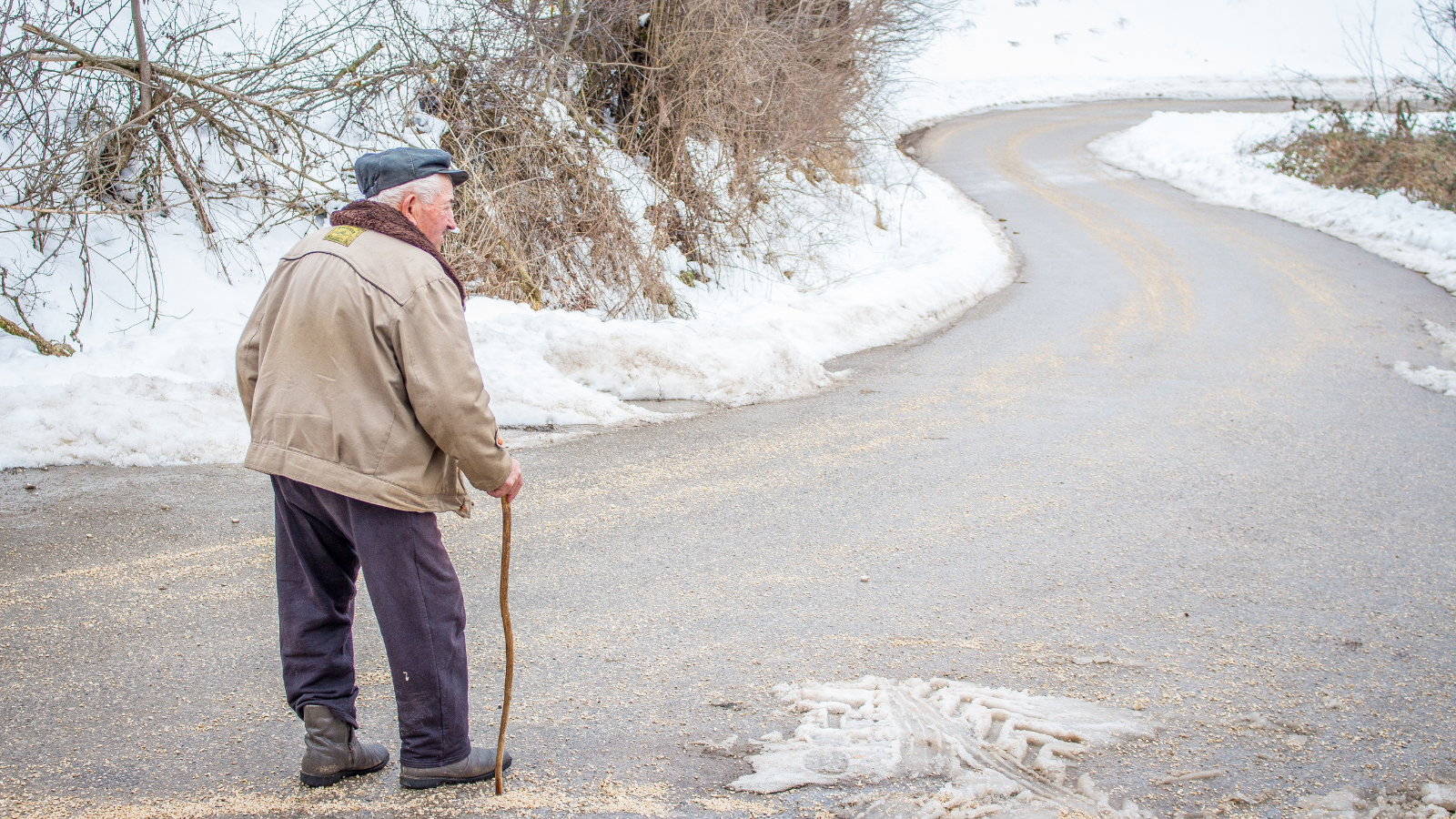As winter sets in, colder temperatures, icy conditions, and shorter days can pose unique challenges for older adults. For seniors, the risks associated with winter weather can be more dangerous due to age-related changes in health, mobility, and circulation. Fortunately, with some preparation and precautions, older adults can enjoy the winter season while staying safe and comfortable.
Here are essential winter safety tips for older adults:
1. Prevent Slips and Falls
The risk of slipping on icy sidewalks or indoor floors increases during the winter months. Falls are a leading cause of injury for older adults,1 but with some simple steps, the risk can be minimized:
- Wear proper footwear: Choose shoes with non-slip soles for both indoor and outdoor use. Avoid high heels or shoes with smooth soles.
- Use assistive devices: If necessary, consider using a cane or walker to improve balance when walking outside.
- Clear walkways: Ensure that pathways around your home are salted, sanded, or shoveled. Ask for help if you are unable to clear them yourself!
2. Maintain Good Health
Cold weather can exacerbate existing health issues, such as arthritis2 and respiratory conditions3. To stay healthy during the winter:
- Check your medications: Some medications can affect the way your body responds to cold weather, so review them with your healthcare provider. Make sure you have enough of any necessary prescriptions, and avoid going outside if you feel unwell.
- Stay hydrated: Winter air can be dry, which can lead to dehydration. Drink plenty of fluids even if you don’t feel thirsty, especially when indoors with heating systems running.
- Eat a balanced diet: Proper nutrition helps keep your body’s energy levels up and supports your immune system, making you less susceptible to winter illnesses like the flu.
3. Stay Physically Active
While outdoor exercise might be challenging in winter, staying physically active is crucial for maintaining strength, balance, and mobility. Consider indoor activities such as:
- Chair exercises: Simple movements, like seated leg raises, arm lifts, and stretches, can help maintain flexibility and strength.
- Walking indoors: Walk around your home or find a local indoor space, like a mall, to keep up with walking routines.
- Yoga or stretching: Yoga can improve balance and flexibility while stretching can help reduce stiffness and discomfort from cold weather.
4. Stay Connected
Winter weather can sometimes lead to isolation, especially if it is too cold or icy to venture outside. It is important to stay connected with friends, family, or caregivers:
- Check-in regularly: Set up regular check-ins with a loved one or a friend. If you do not have family nearby, consider connecting with community organizations or using technology (like video calls) to stay in touch.
- Emergency plan: Make sure someone knows your schedule, where you are, and how to reach you in case of an emergency. Keep a list of emergency contacts close by.
5. Prepare Your Home
Make your living space as winter-friendly as possible to reduce risks and stay comfortable:
- Avoid space heaters without supervision: Never leave a space heater unattended, and ensure that it’s placed in a safe area away from flammable materials.
- Keep indoor air humidified: Use a humidifier to prevent dry air, which can cause skin irritation and respiratory issues.3
- Check heating systems: Ensure your home’s heating system is working efficiently. Keep a carbon monoxide detector in the home, especially if you use gas heating.
Conclusion
While winter weather can present challenges for older adults, with the right preparation and mindset, these risks can be managed. By staying warm, active, and vigilant about potential hazards, seniors can enjoy a safer and more comfortable winter season. Prioritize safety and well-being, and do not hesitate to ask for help when needed—whether it is clearing your walkway, shoveling snow, or simply having a companion. For help with staying active indoors, consider physical therapy or personal training. With these simple precautions in place, older adults can enjoy the winter months with peace of mind.
Resources
- Kakara, Ramakrishna et al. “Nonfatal and Fatal Falls Among Adults Aged ≥65 Years – United States, 2020-2021.” MMWR. Morbidity and mortality weekly report vol. 72,35 938-943. 1 Sep. 2023, doi:10.15585/mmwr.mm7235a1
- Mori, Hiroaki et al. “Influence of seasonal changes on disease activity and distribution of affected joints in rheumatoid arthritis.” BMC musculoskeletal disorders vol. 20,1 30. 18 Jan. 2019, doi:10.1186/s12891-019-2418-2
- D’Amato, Maria et al. “The impact of cold on the respiratory tract and its consequences to respiratory health.” Clinical and translational allergy vol. 8 20. 30 May. 2018, doi:10.1186/s13601-018-0208-9
What makes us different? Our care comes to you!
View Our Service AreaWe Are A Comprehensive Mobile Company Focused on Wellness, Fitness, Rehabilitation, and Prevention
We specialize in transforming the lives of seniors, adults and teenagers with a wide array of diagnoses and conditions in their home or location of choice. You deserve to be your best self through good health and wellness. We would love to have the privilege to work with you or a loved one.
Request a FREE Consultation Today!
